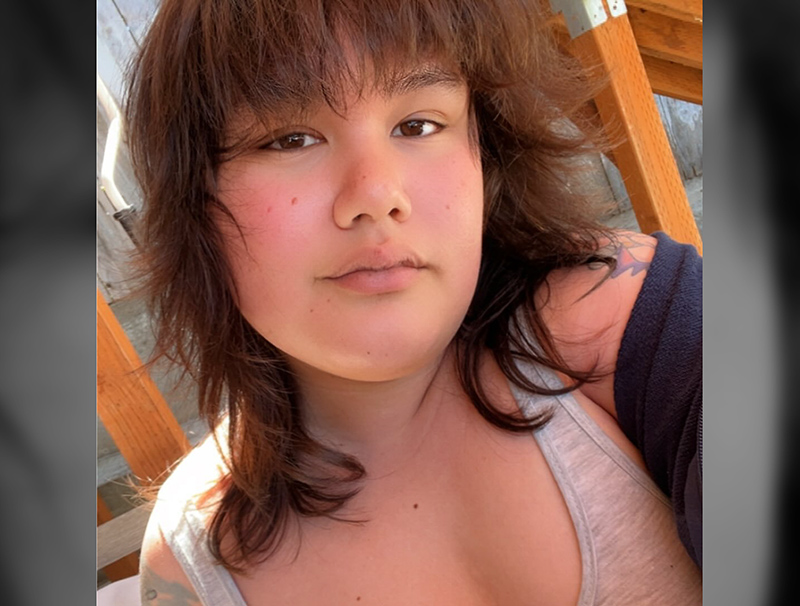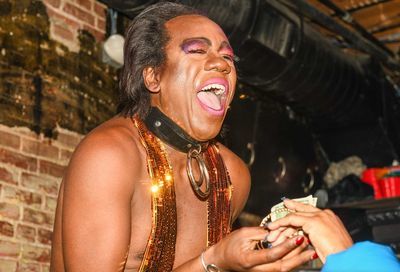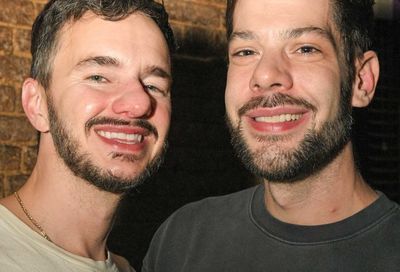A Woman’s Fight, a Couple’s Resilience
Mia Macy is a veteran and police officer, married to the woman she met in her teens, who wanted to take a job as a ballistics technician for the Department of Alcohol, Tobacco, Firearms and Explosives (ATF).
”I was in the military and then I became a cop. One of the last jobs I had with the Phoenix Police Department, I worked on an ATF [team], and it’s a gun squad, and I was certified by the ATF. They came in and they certified us for these pieces of equipment, and I worked on the gun cases,” she tells Metro Weekly. ”I got a job offer to come out to San Francisco … and work for the ATF in their lab, and went through the process and went through the background and completed that.”

Mia Macy and Trish
Over the course of the process, Macy, who had worked for the Phoenix P.D. as a man, had begun transitioning, and showed up for the background check as Mia.
”We moved out to the [San Francisco] Bay [where the job was to be located], and within three days after my background was completed and they alerted the lab that Mia would be coming to work, I was notified that the position was no longer available — even though I was certified and trained for the job.
”At that point, I needed some help. I didn’t think something was right.”
Macy went to the Transgender Law Center, and she filed a complaint with the ATF, which responded that Macy was not protected from discrimination based on gender identity under Title VII of the Civil Rights Act of 1964.
”How did I feel? It was humiliating. Justice is blind, but in my case she was also deaf — because I wasn’t even allowed in the building.”
Trish, Macy’s wife, says, ”I was shocked initially and didn’t know what we’re going to do at that point. Basically, the burden was placed on me to get a job and to keep a job and then, when I wasn’t having my own personal stress about that, I was also having to be a support for Mia.
”And watching her, she was so defeated. It was so hard to watch because she was clearly the most qualified person. She had already been doing the job, and then to have it taken away from her, she felt like she was being robbed.”
Macy says, ”I had come from being a soldier to going to college to being a cop, so I served my country and my community, and so did Trish, and we both believe in that idea. It was scary for me because I didn’t want to question – I’m smart enough to understand that discrimination happens, but I didn’t want to believe it.”
Macy assesses the situation directly, but with a focus on the greater impact of her case.
”It’s a trial by fire for us, and it’s been an emotionally hard time for us,” she says, ”but, for me, if one other person doesn’t have to go through this, then I already, for myself, have won.”
As Trish says, the situation has been tough on them, but Macy adds, ”We’re kind of meant for each other. We were both in the military, and we kind of have that adapting personality. Everything’s fluid and you adapt to the situation. It sounds goofy, but we both — it’s just one more hardship that you have to adapt to, and we’ve become very regimented to that kind of role.
”My transition, more than the EEOC, has made us more close. You don’t get any closer than if you’re with somebody that goes through this process. And then, on top of it, having the ATF and the EEOC process….
”But it’s something we’ve become able to adapt to. We’re good at it? I don’t know.”
Trish says, ”We’re very resilient.”
Macy laughs, but then gets serious.
”Any discomfort or anything that I might be facing, I don’t see it as a discomfort. Because every second that we can tell the story and talk in a positive way and listen to other people’s opinions, I don’t think it can hurt. It will be good,” she says. ”At the end of the day, this isn’t about me. There is my side, how I feel, that I want justice, but it’s bigger. It’s for every trans person that comes through that door — to have it open a little wider maybe.”

Support Metro Weekly’s Journalism
These are challenging times for news organizations. And yet it’s crucial we stay active and provide vital resources and information to both our local readers and the world. So won’t you please take a moment and consider supporting Metro Weekly with a membership? For as little as $5 a month, you can help ensure Metro Weekly magazine and MetroWeekly.com remain free, viable resources as we provide the best, most diverse, culturally-resonant LGBTQ coverage in both the D.C. region and around the world. Memberships come with exclusive perks and discounts, your own personal digital delivery of each week’s magazine (and an archive), access to our Member's Lounge when it launches this fall, and exclusive members-only items like Metro Weekly Membership Mugs and Tote Bags! Check out all our membership levels here and please join us today!


























